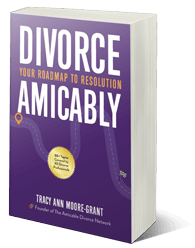The Hidden Cost of Divorce: Mental, Emotional & Personal Toll
Featuring: Jeanette Soltys, Attorney and Founder of Atlanta Holistic Family Law

When people think about divorce, one of the first things they ask is: "How much will it cost?" While financial expense is important, it's far from the full story. In this episode of the Amicable Divorce Network Podcast, I spoke with attorney Jeanette Soltys, founder of Atlanta Holistic Family Law, about the very real—but often overlooked—non-financial costs of divorce.
Jeanette’s personal and professional experiences give her a unique perspective on what truly matters during the divorce process. From mental health strain to relational breakdowns, loss of privacy, and wasted time—these hidden tolls can have long-lasting impacts. Let’s break them down.
1. Mental Health: A Constant Weight
Jeanette shared how a high-conflict custody battle involving her husband opened her eyes to just how emotionally draining litigation can be. “It was the most stressful thing I’ve ever been through,” she admitted—despite the fact that the case didn’t directly involve her own children.
Litigation isn’t a one-day event. It’s months—or even years—of chronic stress. And it doesn't matter if you're the one filing or the one being served. The legal system doesn’t discriminate: both parties are dragged through the emotional ringer.
We must stop underestimating the emotional toll of court-based divorces. The longer a case drags on, the more you live in a state of hyper-vigilance—questioning your actions, dreading the next motion, and feeling like your life is under constant scrutiny.
2. Relational Costs: Broken Bonds Beyond the Couple
Beyond the obvious emotional fatigue, high-conflict litigation erodes relationships that matter deeply—especially co-parenting relationships.
Jeanette pointed out how, even five years later, the litigation her husband went through created long-lasting tension that only now is beginning to heal. “You have to co-parent after the court battle ends,” she emphasized. “And court often destroys the very foundation that good co-parenting needs.”
In the U.S., the court system is adversarial. That means it's not designed to find the truth or foster cooperation—it’s built to pick a winner. When parents are told to throw everything they can at each other to win, the long-term cost is trust, respect, and the ability to work together for their children’s benefit.
3. Loss of Privacy: Your Life Becomes Public Record
One of the most surprising costs of litigation? Your private life may no longer stay private.
From mental health accusations (even false ones) to finances and traumatic personal history, litigation can put deeply personal details in the public record. And that record is permanent and searchable. “Your kids can read it someday,” Jeanette warns. “Future employers, or even people you’re dating, can look it up.”
She’s even seen trauma weaponized in court—experiences a spouse shared in confidence later used to undermine their parenting. That betrayal doesn’t just hurt—it stays in the system forever.
4. Time: Litigation Wastes More of It Than You Think
You think you'll get a court date, prepare for it, and be heard? Think again.
Judges’ calendars are overbooked, and cases often get bumped multiple times. Jeanette described situations where her clients had to shut down businesses or cancel once-in-a-lifetime vacations only to be told, “Come back in two months.”
Discovery—the pre-trial process of gathering evidence—is another time sink. Jeanette explained it’s like a second job. Clients spend countless hours gathering irrelevant documents “just in case,” only for most of them to never be used.
In an amicable divorce, this is streamlined. “We ask for what we need, not for what we might need,” she said. “And that saves hours—if not weeks—of work and stress.”
The Amicable Alternative: Save Time, Sanity, and Relationships
Jeanette, a longtime member of the Amicable Divorce Network, now focuses her law practice on helping people resolve their divorces efficiently and out of court.
“With the amicable process, most of my cases are resolved in 6–12 months,” she shared. “It’s confidential, tailored, and we work around your schedule instead of forcing you into a system that doesn’t care if you’re recovering from surgery or traveling for work.”
And no—it’s not about attorneys making less money. “I don’t make less. I just get to help more people,” Jeanette said. That’s what brought her (and many of us) to family law in the first place.
Final Thoughts: Think Beyond the Dollars
If you're contemplating divorce, consider more than just the financial costs. Ask yourself:
- How much stress can I take on?
- What is this going to do to my relationship with my children—or my co-parent?
- Am I comfortable putting my personal life into public record?
- How much of my time am I willing to sacrifice to a broken court system?
There’s a better way. Amicable Divorce Network exists to connect people with vetted professionals—attorneys, mediators, financial and mental health experts—who are resolution-focused and believe in doing divorce differently.
To learn more about Jeanette Soltys, visit atlholisticfamilylaw.com or find her on all major platforms @atlholisticfamilylaw.
And don’t forget—get your copy of Divorce Amicably: Your Roadmap to Resolution on Amazon.
Myth #4: It Matters Who Files for Divorce First
Many people rush to the courthouse under the belief that filing first gives them a legal advantage. But in most cases, it makes no difference in the outcome.
When Does Filing First Matter?
🚨 Emergencies. If there are domestic violence concerns, financial abuse, or child safety risks, filing first can be necessary to secure protective orders or temporary custody arrangements.
📝 Guiding the divorce process. Filing first allows a spouse to propose using the amicable divorce process before the other party hires a high-conflict attorney. If you wait too long, your spouse may hire an aggressive lawyer, locking you into litigation that is difficult to escape.
In most situations, though, who files first does not affect financial settlements or custody decisions—what matters is how the case is handled once the process begins.
Myth #5: “If We Agree on Everything, We Can Just Download Forms Online”
While there are plenty of do-it-yourself divorce kits available online, relying solely on them can be risky—even in seemingly simple cases. Every couple’s situation has unique nuances that generic forms can’t fully address, especially when it comes to retirement accounts, real estate, debts, or parenting schedules.
Even if you’re pursuing an uncontested divorce, it’s still wise to have an attorney review the documents to make sure everything is enforceable, fair, and in compliance with Georgia law. Errors or omissions in DIY paperwork can cause delays, rejections by the court, or worse—leave you exposed to future legal issues.
An attorney can ensure your agreements are solid, protect you from oversights, and give you peace of mind that your fresh start is on firm ground.
How to Divorce Smarter: The Amicable Divorce Process
The myths surrounding divorce can lead people into unnecessary conflict, wasted time, and enormous legal fees. The Amicable Divorce Network offers a better way:
🔹 Work with resolution-focused professionals who prioritize fairness, efficiency, and respect.
🔹 Keep control over the process instead of leaving critical life decisions up to a random judge.
🔹 Save money and time by avoiding unnecessary court battles.
🔹 Protect children from conflict by fostering cooperation instead of hostility.
If you’re considering divorce, take the first step toward an amicable resolution. Reach out today to learn how the process can work for you.
📩 Contact us at info@amicabledivorcenetwork.com
🔎 Find an Amicable Divorce Professional: Visit our website
Recent Posts
From the Book: Divorce Amicably
Chapter 5: Myths About Divorce
Divorce is rarely easy, even under the best circumstances. When most people consider the costs of divorce, their minds jump to the obvious: attorney fees, court costs, and the division of assets. But while the financial toll can be significant, the emotional and relational costs often weigh just as heavily – and, in many cases, even more so. For those contemplating such a life-changing decision, understanding divorce’s non-financial costs is crucial to making informed, thoughtful choices.









